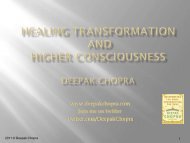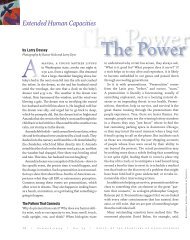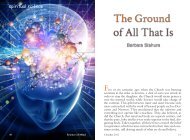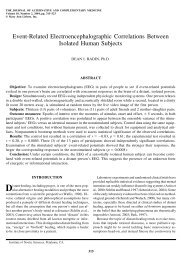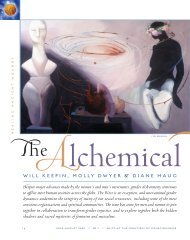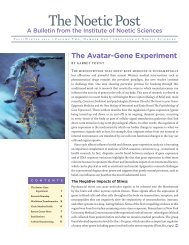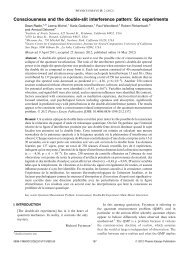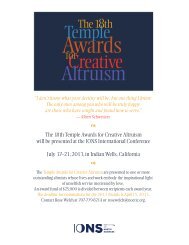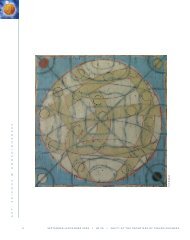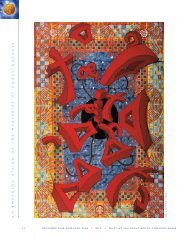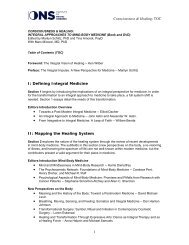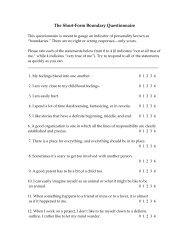Consciousness & Healing - Institute of Noetic Sciences
Consciousness & Healing - Institute of Noetic Sciences
Consciousness & Healing - Institute of Noetic Sciences
Create successful ePaper yourself
Turn your PDF publications into a flip-book with our unique Google optimized e-Paper software.
Americans to have lived most <strong>of</strong> his life outside the<br />
European-American culture. When our disposition and<br />
thinking are severed from the balancing and restorative<br />
powers <strong>of</strong> earth’s natural systems, says ecopsychologist<br />
Michael J. Cohen, we suffer. Frances E. Kuo, a cognitive<br />
and environmental psychologist at the University <strong>of</strong><br />
Illinois, has been examining the impacts <strong>of</strong> green spaces<br />
on human functioning. Her award-winning studies<br />
with women living in a housing project in Chicago’s inner<br />
city showed that those whose apartments gave<br />
them a view <strong>of</strong> a courtyard filled with trees and flowerbeds<br />
scored significantly higher on tests <strong>of</strong> attention<br />
and in surveys on handling life challenges. Kuo’s work<br />
is making a difference with policymakers; for example,<br />
it has led to a $10 million tree planting in Chicago, an<br />
urban forestry resolution at the U.S. Conference <strong>of</strong><br />
Mayors, and a national research agenda on community<br />
design and health with the Center for Disease Control. A<br />
recent study led by cognitive psychologist Marc Berman<br />
<strong>of</strong> the University <strong>of</strong> Michigan further demonstrates<br />
the restorative effects <strong>of</strong> natural environments on our<br />
mental abilities. Research participants who walked in a<br />
park and later simply viewed photos <strong>of</strong> nature showed<br />
significant improvements in memory and attention<br />
tasks when compared with participants who instead<br />
walked downtown and later viewed photos <strong>of</strong> city life<br />
(Psychological Science, December 2008).<br />
In Born to Be Good (see review on page 44),<br />
Dacher Keltner, pr<strong>of</strong>essor <strong>of</strong> psychology at University <strong>of</strong><br />
California, Berkeley, explores nature’s power to elicit the<br />
transformative effects <strong>of</strong> awe, another form <strong>of</strong> human<br />
happiness. He draws in part upon the inspirational<br />
writings <strong>of</strong> naturalist John Muir, such as the following:<br />
“We are now in the mountains, and they are in us,<br />
kindling enthusiasm, making every nerve quiver, filling<br />
every pore and cell <strong>of</strong> us. Our flesh-and-bone tabernacle<br />
seems as transparent as glass to the beauty about us, as<br />
if truly an inseparable part <strong>of</strong> it.” The experience <strong>of</strong> awe<br />
gives us a sense <strong>of</strong> our rightful place in the natural world,<br />
as it moves us beyond self-interest to an awareness<br />
<strong>of</strong> collective well-being. “A Darwinian study <strong>of</strong> awe,”<br />
writes Keltner, “is documenting the physiological under-<br />
pinnings <strong>of</strong> our capacity to devote ourselves to the<br />
collective . . . [Awe] transforms self-representation from<br />
that which separates to that which unites.”<br />
Extending our understanding <strong>of</strong> happiness beyond<br />
the individual to the collective is what is needed<br />
now. Cycles <strong>of</strong> destabilization throughout evolution<br />
create new demands on selection for survival, and our<br />
response to the many crises we now face as individuals,<br />
societies, and a planet converge in the area <strong>of</strong> cooperative<br />
relationships and collective well-being. Writing on<br />
the evolution <strong>of</strong> happiness, David Buss, pr<strong>of</strong>essor <strong>of</strong><br />
psychology at the University <strong>of</strong> Texas, Austin, notes<br />
that, “Evolutionists have identified one <strong>of</strong> the key<br />
conditions that promote cooperation—shared fate.”<br />
This is where research on happiness could now take us<br />
as we reckon with our global interdependence.<br />
“Our circumstances are always tenuous,” says<br />
neurosurgeon James R. Doty, founder <strong>of</strong> Project<br />
Compassion at Stanford University, “but an abiding<br />
concern for others mitigates powerfully against<br />
attitudes <strong>of</strong> hopelessness and despair.” The project<br />
draws together neuroscientists, neuroeconomists,<br />
psychologists, scholars, and contemplative experts<br />
to develop an interdisciplinary research agenda<br />
that examines the neural, moral, and social bases<br />
for compassion and altruism. The goal is to bring<br />
compassion not only into the mainstream <strong>of</strong> scientific<br />
discourse but also into public life, as the research identifies<br />
secular tools to share with the public.<br />
His Holiness the Dalai Lama has given Project<br />
Compassion the largest personal financial donation<br />
he has ever given—but then, when it comes to finding<br />
happiness, it is the Dalai Lama who says, “If you want to<br />
be happy, practice compassion. If you want others to be<br />
happy, practice compassion.” Ricard, that happiest man<br />
in the world, frames it this way: “If you have a society<br />
<strong>of</strong> selfish people, combined one-to-one with altruistic<br />
people, theoretically the altruists should be wiped out.<br />
But altruists can cooperate, which gives them a strong<br />
advantage. That is the cause <strong>of</strong> hope.”<br />
VeSeLA SImIC is senior editor <strong>of</strong> Shift<br />
magazine. After earning a master’s in<br />
English literature and literary criticism at<br />
the University <strong>of</strong> Chicago, she moved to the<br />
San Francisco Bay Area to teach. Before<br />
joining IONS three years ago, her work in<br />
publishing included editorial roles at Yoga Journal, WestEd,<br />
and Conari Press.<br />
Spring 2 0 0 9 | N o . 2 2 | S H I F T: A T T H E F RONTIERS OF C ONSCIOUSNESS | 19



